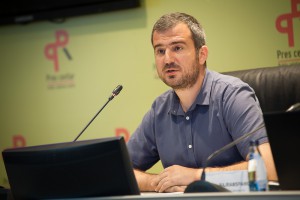Substantive dialogue on burning issues still lacking in Montenegro
Montenegro is one of the countries that have made great progress in the EU accession process. Recently published EU Enlargement Strategy for the Western Balkans has also recognised this fact. Do you agree with this assessment? Would you describe the pace of Montenegro’s negotiating process as satisfactory?
Accolades for the progress, as well as the persistent emphasis on having assumed the “leadership in the region”, fail to motivate the authorities to do more and to do better. They also neither strengthen nor meaningfully include civil society, media and democratic opposition interested in reforms. Citizens are unable to perceive the progress in curbing the entanglement of public and ruling party’s interests, nor in the efforts of dismantling the links with organised crime and corruption at all government levels. Weak and politicised institutions, impunity for the corrupted officials and misuse of public funds, state interference into media market, jeopardizing the independence of public broadcaster feat by the ruling Democratic Party of Socialists (DPS), hostile actions towards critically oriented CSOs and targeting their leaders – all of these issues are still existent and persistent in Montenegro, Western Balkans EU accession “frontrunner”?
Institute Alternative (IA) is a think tank that has been following the process of EU integration of Montenegro. How has the role of civil society changed in the past 11 years? Is the civil society more included in this process now than it was at its beginning?

Stevo Muk, President of the Managing Board of the Institute Alternative
Along the path to European integration, civil society has been adapting to current issues and tasks, building capacities for monitoring complex negotiating chapters. However, although often praised, formal participation of CSOs in negotiating groups has not provided significant contribution nor it has ensured greater influence of CSOs on key documents. Following the adoption of Negotiating Positions, the negotiating groups have mainly turned passive. Numerous negotiating groups have not met in years, and it was only last year when the measures for 17 negotiating chapters were published on the CSO’s request. The exception are the meetings of the Negotiating Group for the Chapter 23, whereas there is an obligation of delivering semi-annual reports on the action plans implementation. However, the substantive dialogue on burning issues is still lacking. Key discussions are held outside negotiating groups, within the processes of drafting concrete laws and strategies, but also via public and other types of discussion between the government and civil society.
What are the biggest challenges that civil society in Montenegro has faced since the beginning of the EU integration process? What obstacles has your organisation been forced to overcome?
Critically-oriented CSOs and independent media provide a key incentive and contribution to reforms in the areas of rule of law, anti-corruption and public administration reform. At the same time, we are confronted with different types of resistance and the pressure coming from those who do not benefit from the reform process – from unwillingness of the state to support our efforts as legitimate, to disputing and discrediting by various means. In spite of everything, we keep on striving to offer our full contribution in various fora where a dialogue on the quality of laws and policies adopted by the Government and in the Parliament are being conducted. We are exerting influence by placing important topics on the media’s agenda, thus ensuring public dialogue is held on them.
IA is a member of the regional Think for Europe Network (TEN) and one of the key partners in the regional WeBER Project. What are current WeBER Project activities being implemented in Montenegro?
At the moment, we are focused on completing research for the regional PAR Monitor. It is a very demanding task, as we have set high standards with our PAR Monitor Methodology, and now we are combining multiple research methods – surveys (public perception survey, surveys for civil servants and civil society representatives), focus groups, interviews, FOI requests, desk research – to obtain answers to the questions that measure the real extent of the public administration reform process.
Additionally, our grantees are finalising their projects, providing an insight into developments of public administration reform at the local level.
What are the most significant ongoing projects Institute Alternative is implementing? What subject are those projects focused on and why those particular subjects?
Our key initiatives are focused on the public administration reform process in Montenegro, as well as on one of its key component – Public Finance Management Reform Programme. We are trying to clarify what way the mechanisms for managing public money are being reformed, if at all, and, at the same time, raise awareness of the Government commitments among the public.
We are increasingly cooperating with other CSOs in the country, seeking to garner interests in these topics, traditionally not in the focus of CSOs, as well as with the investigative journalists, trying to come up with a way of communicating our findings and the results obtained, as well as policy work, in a way that would appeal to the general public and interest the citizens.
*This interview is produced as a part of the fifth issue of the TEN Newsletter.

